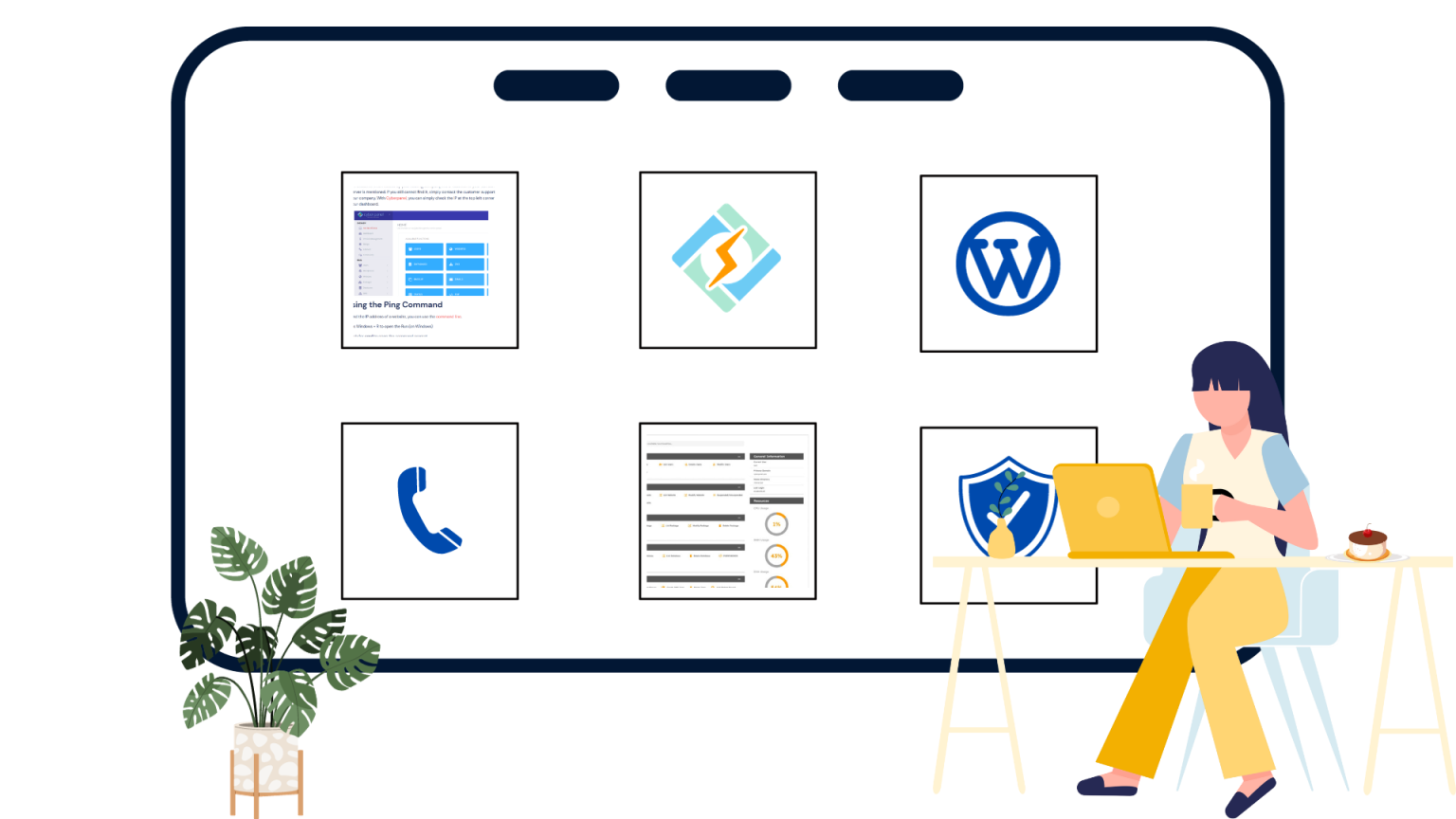The choice of the best e-commerce framework is a critical decision for any business looking to establish or expand its online presence. In the dynamic world of e-commerce, selecting the right platform is essential to ensure a seamless and successful online shopping experience for customers. With a multitude of e-commerce frameworks and platforms available, each offering a unique set of features, scalability, and customization options, businesses must carefully consider their specific requirements, budget constraints, and technical expertise to determine which e-commerce solution best suits their needs.
What is an E-commerce Framework?
An e-commerce framework, in the context of online retail and business, is a foundational software structure that provides the necessary tools and infrastructure for creating and managing an e-commerce website or online store. It serves as a pre-built platform that simplifies the process of setting up and running an online business. An e-commerce framework typically includes features and functionalities for product management, shopping cart functionality, payment processing, order fulfillment, inventory management, and more.
E-commerce frameworks come in various forms, including open-source solutions, SaaS (Software as a Service) platforms, and headless commerce systems. Each type of framework has its own characteristics and advantages, and businesses can choose the one that best aligns with their specific needs and goals. These frameworks provide the structure and tools needed to build a visually appealing and fully functional online store, making it easier for businesses to enter the world of e-commerce and start selling products or services online.
Key Features of an E-commerce Framework
The five most important features that an e-commerce framework should have are:
Product Management
Effective tools for adding, organizing, and managing product listings, including support for product attributes, categories, and stock levels. This feature is essential for maintaining an up-to-date product catalog.
Secure Checkout Process
A secure and user-friendly checkout process with support for various payment methods and encryption protocols. Security is paramount to protect customer data and build trust.
Get exclusive access to all things tech-savvy, and be the first to receive
the latest updates directly in your inbox.
Mobile Optimization
Mobile-friendly design and responsive layout to ensure seamless shopping experiences on smartphones and tablets. With the growing use of mobile devices for online shopping, mobile optimization is critical.
SEO Features
Built-in search engine optimization capabilities, including customizable URLs, meta tags, and structured data markup, to improve the store’s visibility in search engine results. Effective SEO is vital for attracting organic traffic.
Third-Party Integrations
Support for third-party plugins and integrations that extend the functionality of the online store. These integrations can include social media, marketplace connections, and CRM systems, enhancing the overall shopping experience and expanding the store’s capabilities.
Top 15 E-commerce Frameworks And Platforms
E-commerce has become an integral part of the modern business landscape, and selecting the right e-commerce framework or platform is crucial for the success of online businesses. Below are the platforms.
1. Magento

Magento is a robust and highly acclaimed e-commerce platform known for its flexibility, scalability, and extensive features. Magento offers both an open-source version (Magento Open Source) and a commercial version (Magento Commerce). The open-source version is free to use and highly customizable, while the commerce version provides additional features and support for larger enterprises. Magento is known for its scalability, making it suitable for businesses of all sizes, from small startups to large enterprises.
Features
- Open Source
- Scalability
- Customization
- Community Support
- Multilingual Support
- Mobile-Friendly
- SEO Features
- Catalog Management
- Payment Options
- Analytics and Reporting
- Security Emphasis
- Extensions and Integrations
2. Woocommerce

WooCommerce is a widely recognized e-commerce plugin designed specifically for WordPress, known for its user-friendliness and extensive plugin ecosystem. WooCommerce seamlessly integrates with WordPress, which is one of the most popular and widely used content management systems (CMS). This integration allows users to add e-commerce functionality to their existing WordPress websites, making it a convenient choice for those already familiar with the platform.
Features
- Seamless Integration with WordPress.
- Ease of Use.
- Extensive Plugin Ecosystem.
- Customization Options.
- Scalability.
- Active Community Support.
- SEO Tools.
- Mobile Responsiveness.
- Payment and Shipping Options.
- Security Emphasis.
- Analytics and Reporting.
3. Shopify
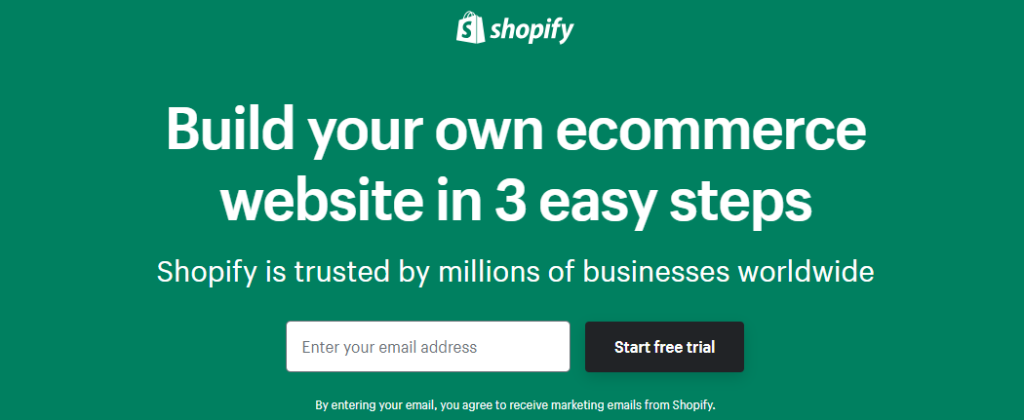
Shopify is a leading e-commerce platform renowned for its simplicity, versatility, and comprehensive set of features. Shopify is celebrated for its user-friendly setup and intuitive interface. It offers a straightforward process for launching an online store without requiring extensive technical expertise. This accessibility makes it an attractive option for entrepreneurs and small business owners.
Features
- User-Friendly Setup
- Hosted Solution
- Versatile Design and Themes
- App Store
- Mobile Responsiveness
- Payment Gateway Options
- Inventory Management
- Order Processing and Fulfillment
- SEO-Friendly
- Secure and Reliable
- Analytics and Reporting
- Scalability
3. BigCommerce
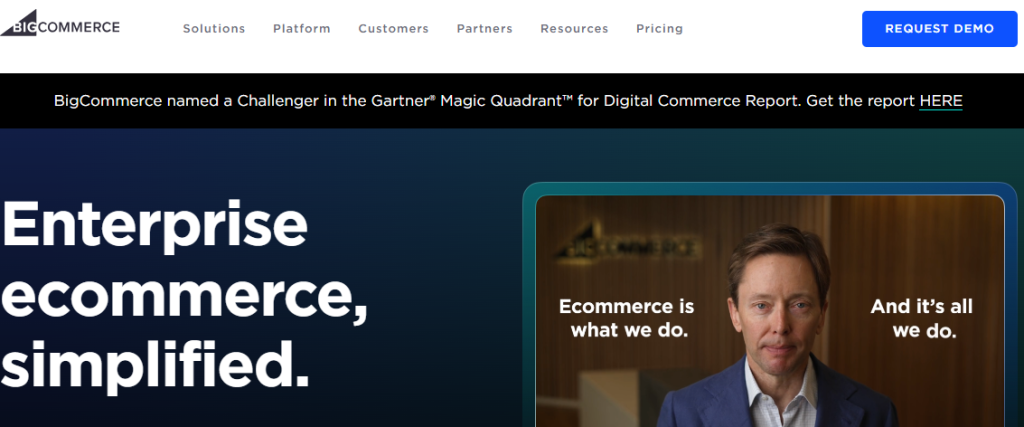
BigCommerce is a robust and widely recognized e-commerce platform known for its scalability, flexibility, and rich feature set. BigCommerce is designed to accommodate businesses of all sizes. From startups to established enterprises, it offers the flexibility to grow with your business, handling a high volume of products, customers, and traffic.
Features
- Scalability
- Multi-Channel Selling
- Mobile Optimization
- Customization and Theming
- App Store
- Payment Options
- Inventory Management
- Security
- SEO-Friendly
- Analytics and Reporting
- Customer Support and Training
- Enterprise-Grade Features
4. PrestaShop
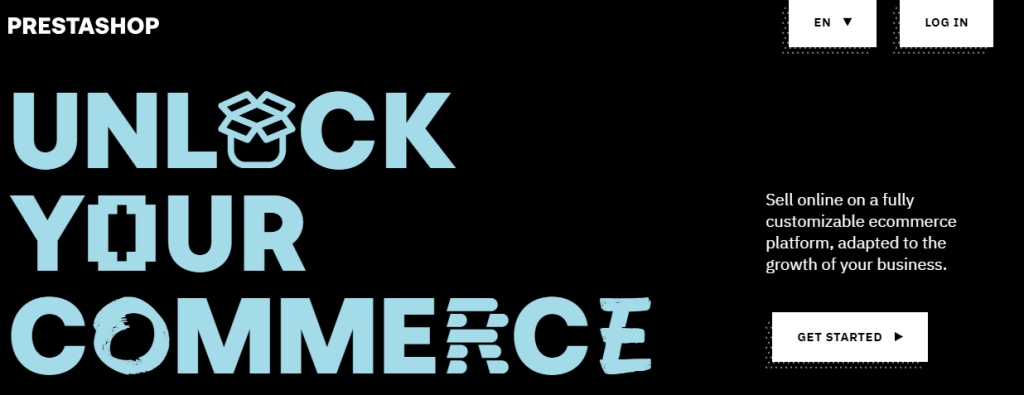
PrestaShop is an open-source e-commerce platform that has gained recognition for its user-friendly interface, extensive customization options, and robust feature set. PrestaShop is an open-source solution, which means it is free to use and can be customized according to the specific needs of an online store. Users have access to the source code, allowing for deep-level modifications.
Features
- Open-Source and Free
- User-Friendly Interface
- Extensive Customization
- Feature-Rich
- Multi-language and Multi-Currency Support
- Mobile Responsiveness
- Payment and Shipping Options
- SEO-Friendly
- Community and Support
- Security
- Analytics and Reporting
5. OpenCart
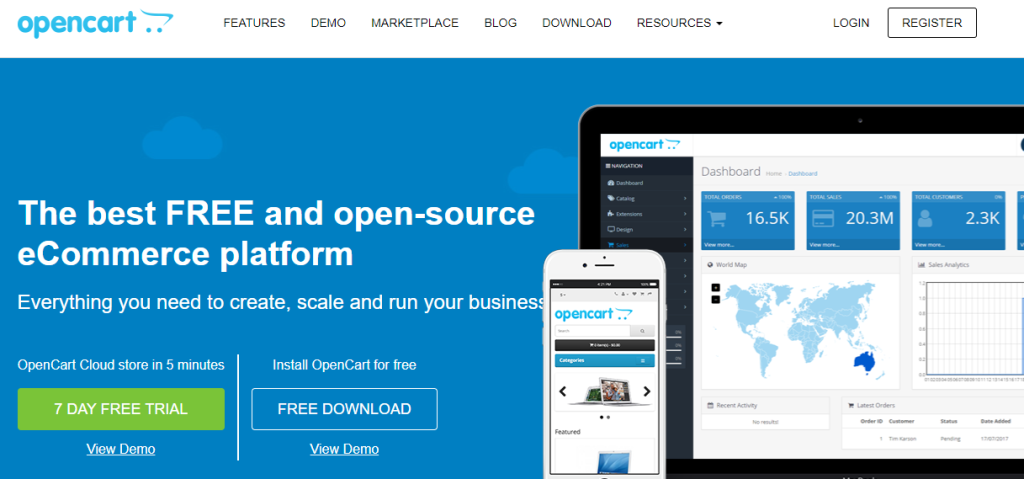
OpenCart is a popular open-source e-commerce platform that is highly regarded for its user-friendly interface, extensive customization capabilities, and affordability. OpenCart is an open-source solution, which means it is free to use and the source code is accessible. This open nature allows for extensive customization and modification of the platform to suit specific business needs.

Features
- Open-Source and Free
- User-Friendly Interface
- Scalability
- Customization Options
- Feature-Rich
- Multi-language and Multi-Currency Support
- Mobile Responsiveness
- Payment and Shipping Options
- SEO-Friendly
- Community and Support
- Security
- Analytics and Reporting
6. Wix eCommerce
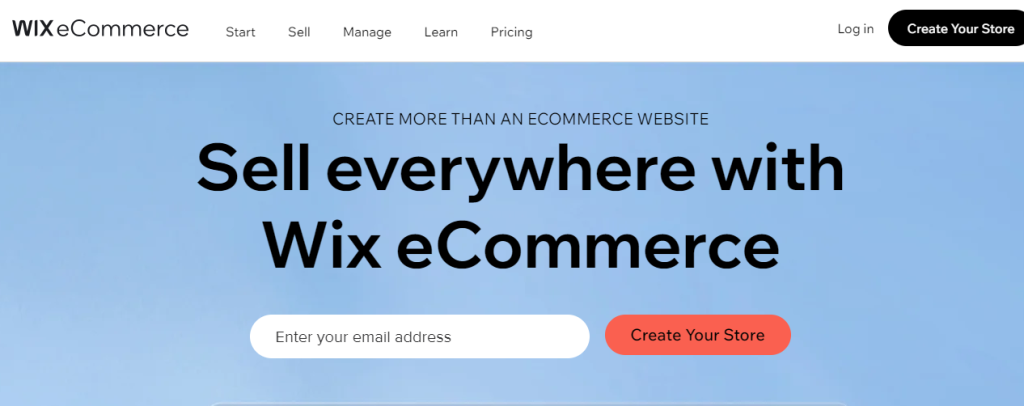
Wix eCommerce is a part of the Wix platform, which is a versatile website builder that allows users to create and manage their online presence easily. Wix eCommerce seamlessly integrates e-commerce capabilities into its website builder. This means users can build their online store and the accompanying website all within one platform. It’s a convenient and efficient way to manage your online presence.
Features
- Website Builder and E-commerce in One
- User-Friendly Interface
- Template Selection
- Product Management
- Payment Options
- Mobile Responsiveness
- Shipping and Tax
- SEO Tools
- App Market
- Security
- Customer Support
- Analytics and Reporting
7. 3dcart
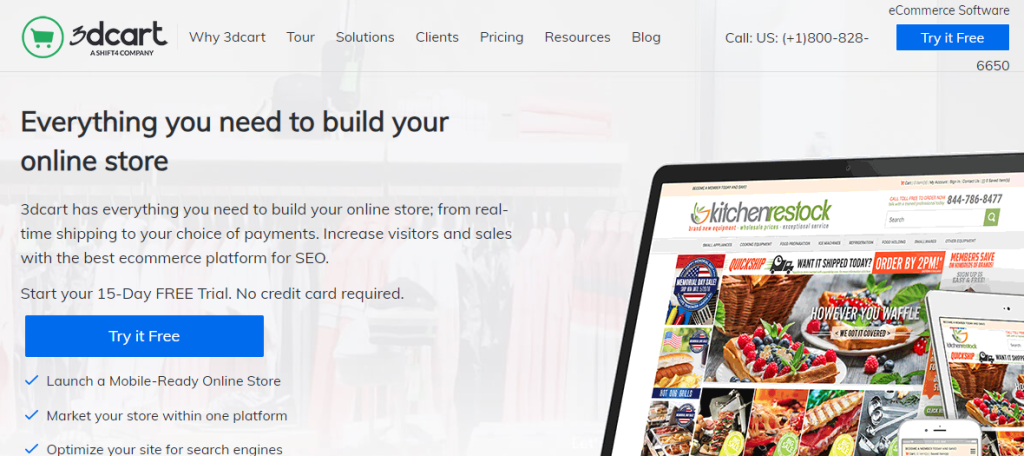
3dcart is an e-commerce platform designed to help businesses establish and manage their online stores. 3dcart provides an intuitive and user-friendly interface that makes it accessible to users with varying technical expertise. Setting up an online store, adding products, and managing content are straightforward processes.
Features
- User-Friendly Interface
- Scalability
- Customization Options
- Feature-Rich
- Mobile Responsiveness
- Payment and Shipping Options
- SEO-Friendly
- App Store
- Security
- Customer Support
- Analytics and Reporting
8. Volusion
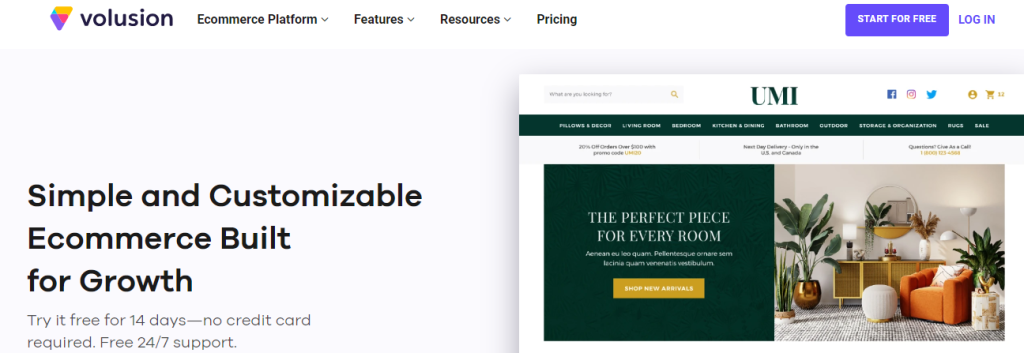
Volusion is an e-commerce platform that empowers businesses to create and manage their online stores. Volusion is known for its intuitive and user-friendly interface. The platform simplifies the process of setting up and managing online stores, making it accessible to users with varying technical expertise. Volusion offers a range of customization options, including templates and themes. Users can select from a variety of designs and personalize them to align with their brand’s identity.
Features
- User-Friendly Interface
- Customization Options
- Product Management
- Mobile Responsiveness
- Payment and Shipping Options
- SEO-Friendly
- Security
- App Store
- Customer Support
- Analytics and Reporting
9. Zen Cart
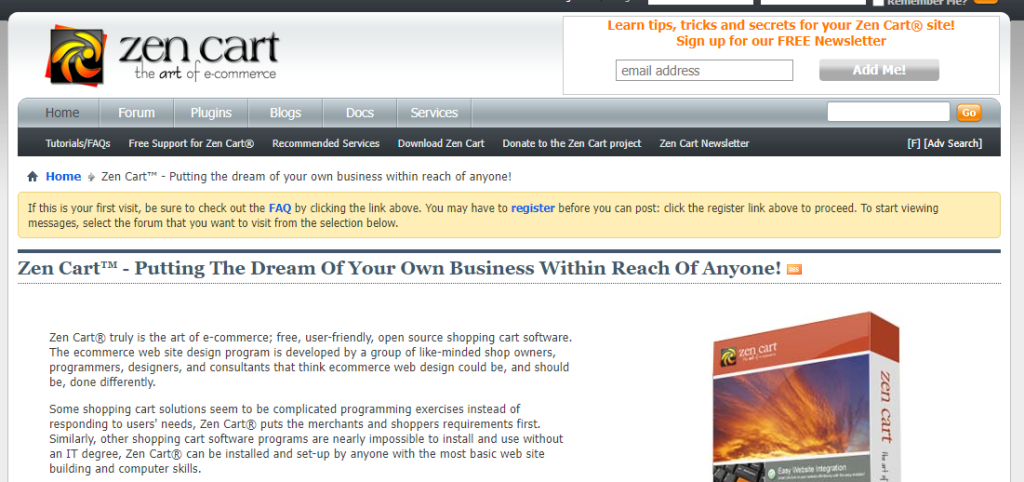
Zen Cart is a robust and open-source e-commerce platform that enables businesses to create and manage online stores. It’s built on PHP and uses MySQL as the database management system. Zen Cart provides a range of features to help users set up and customize their online retail operations. en Cart is an open-source solution, which means it’s free to use and offers access to the platform’s source code. This open nature allows for extensive customization and modification to meet specific business needs.
Features
- Open-Source and Free
- User-Friendly Interface
- Template Selection
- Feature-Rich
- Multi-language and Multi-Currency Support
- Mobile Responsiveness
- Payment Gateway Options
- Shipping and Tax Management
- SEO-Friendly
- Community and Support
- Security
- Analytics and Reporting
10. nopCommerce
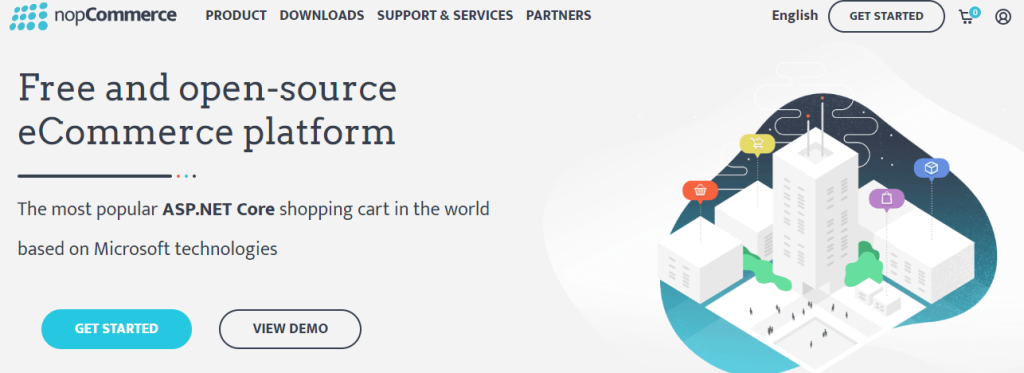
nopCommerce is a popular and open-source e-commerce platform that provides businesses with the tools to create and manage online stores. nopCommerce is an open-source solution, which means it is free to use and the source code is accessible. This open nature allows for extensive customization and modification of the platform to meet specific business needs.
Features
- Open-Source
- User-Friendly Interface
- Customization Options
- Feature-Rich
- Multi-language and Multi-Currency Support
- Mobile Responsiveness
- Payment Gateway Options
- Shipping and Tax Management
- SEO-Friendly
- Community and Support
- Security
- Analytics and Reporting
11. Drupal Commerce

Drupal Commerce is an e-commerce framework that is tightly integrated with the Drupal content management system (CMS). This platform is specifically designed for businesses and organizations that want to build robust and customizable online stores while leveraging the power and flexibility of Drupal. Being built on the Drupal CMS, Drupal Commerce offers seamless integration with your website’s content.
Features
- Open Source
- Seamless Integration
- Highly Customizable
- Multi-Channel Selling
- Mobile Responsiveness
- Payment Options
- SEO-Friendly
- Security
- Content-First
- Scalability
- Community Support
- Analytics Tools
12. Squarespace Commerce

Squarespace Commerce is an integrated e-commerce platform that’s part of the broader Squarespace website building and hosting service. Squarespace is known for its user-friendly website design capabilities, and Squarespace Commerce extends those features to online stores. Squarespace Commerce is designed with a focus on user-friendliness. The platform’s intuitive website builder allows users to easily create and manage their online stores without requiring extensive technical expertise.
Features
- Ease of Use
- Template Selection
- Inventory Management
- Mobile Responsiveness
- Payment and Shipping Options
- SEO-Friendly
- Security
- App Integration
- Analytics and Reporting
- Customer Support
- Scalability
- Marketing Features
13. Ecwid
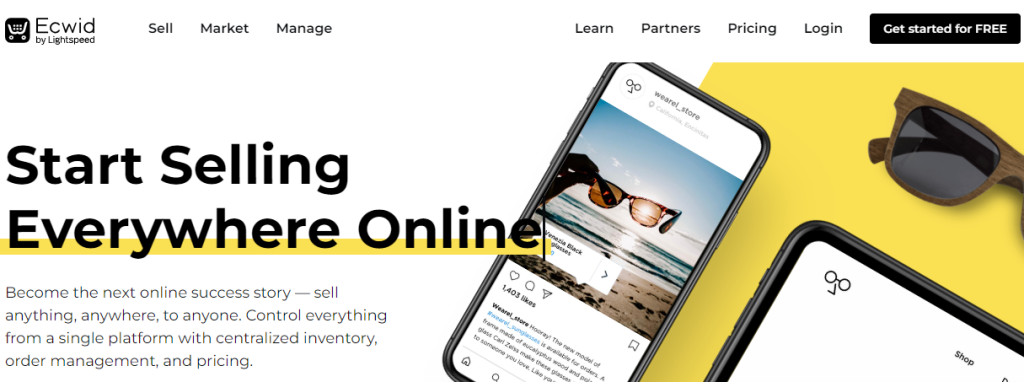
Ecwid is a versatile and user-friendly e-commerce platform that enables businesses to set up and manage online stores seamlessly. Ecwid can be easily integrated into existing websites, social media, and other platforms. This means businesses don’t have to build a separate website for their online store, making it a convenient choice for those who already have an online presence.
Features
- Seamless Integration
- User-Friendly
- Mobile Responsiveness
- Inventory Management
- Payment and Shipping Options
- Global Reach
- SEO-Friendly
- Security
- App Integration
- Customer Support
- Scalability
- Analytics and Reporting
14. Salesforce Commerce Cloud
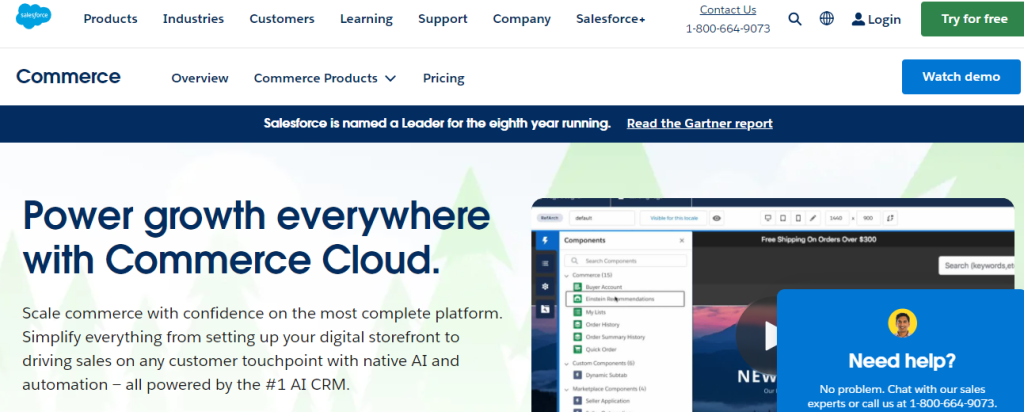
Salesforce Commerce Cloud, formerly known as Demandware, is a robust and cloud-based e-commerce platform designed to help businesses deliver seamless and personalized shopping experiences to their customers. Being a cloud-based platform, Salesforce Commerce Cloud offers the advantage of scalability and flexibility. It ensures that businesses can easily adapt to changing customer demands and scale their online operations as needed.
Features
- Cloud-Based E-Commerce
- Omnichannel Commerce
- Personalization and Customer Experience
- AI-Powered Insights
- Robust Content Management
- Global Expansion Capabilities
- Secure Transactions
- Inventory Management
- Streamlined Checkout Process
- App Ecosystem
- Customer Support and Resources
- Analytics and Reporting
15. Kibo
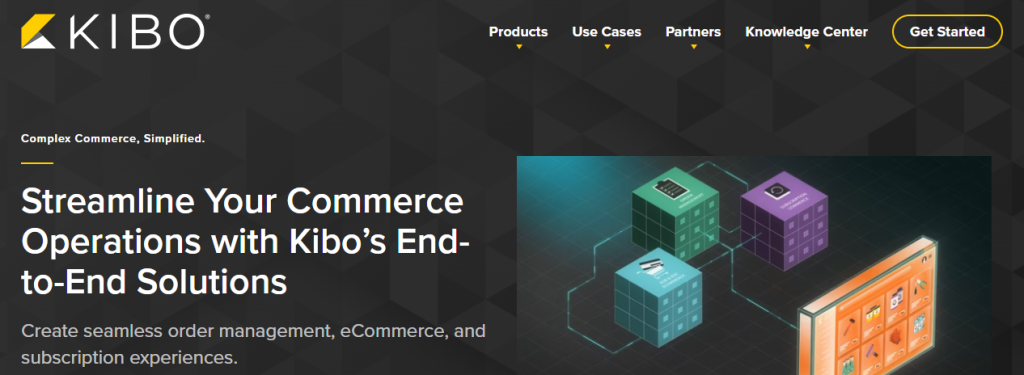
Kibo focuses on unifying the various touchpoints in a customer’s shopping journey. This means that customers can have a consistent and cohesive experience whether they shop online, in-store, via mobile, or through other channels. Kibo Commerce enables businesses to offer a true omnichannel experience, allowing customers to seamlessly move between channels and access the same product information, pricing, and promotions.
Features
- Unified Commerce
- Omnichannel Capabilities
- Personalization and Customer Insights
- Order Management
- Global Expansion
- Secure Transactions
- Content Management
- Customization and Extensibility
- Customer Support
- Analytics and Reporting
FAQs – E-Commerce Framework
What is an e-commerce framework?
An e-commerce framework is a software platform that provides the necessary tools and features to build and manage an online store. It includes components for product management, payment processing, order fulfillment, and more.
What is Open Source e-commerce, and what are its advantages and disadvantages?
Open Source E-commerce refers to software where users have access to the source code and can modify it. It offers extensive customization but requires users to manage updates and security. It can be highly customizable but may have higher total costs of ownership.
What is SEO-Friendly E-commerce, and why does it matter?
SEO-Friendly E-commerce includes features for optimizing the online store to rank higher in search engine results. This is important for attracting organic traffic and improving visibility.
What is Headless E-commerce, and how does it work?
Headless E-commerce decouples the back-end and front-end of an online store, allowing businesses to use various front-end presentation layers. This approach offers flexibility and the ability to use different vendors for the back-end and front-end.
What are the advantages of having a wide range of extensions and integrations for an e-commerce framework?
Extensions and integrations enhance the functionality of an online store. They allow businesses to add features and connect to third-party systems, expanding the store’s capabilities.
Conclusion
In conclusion, the world of e-commerce is continually evolving, and selecting the right e-commerce framework is a pivotal decision for businesses of all sizes. The diverse options available cater to different needs and preferences, whether you prioritize ease of use, customization, scalability, or specific features. SaaS platforms like Shopify and BigCommerce offer simplicity and quick setup, making them ideal for startups. Open-source solutions like Magento provide extensive customization but demand technical expertise.


